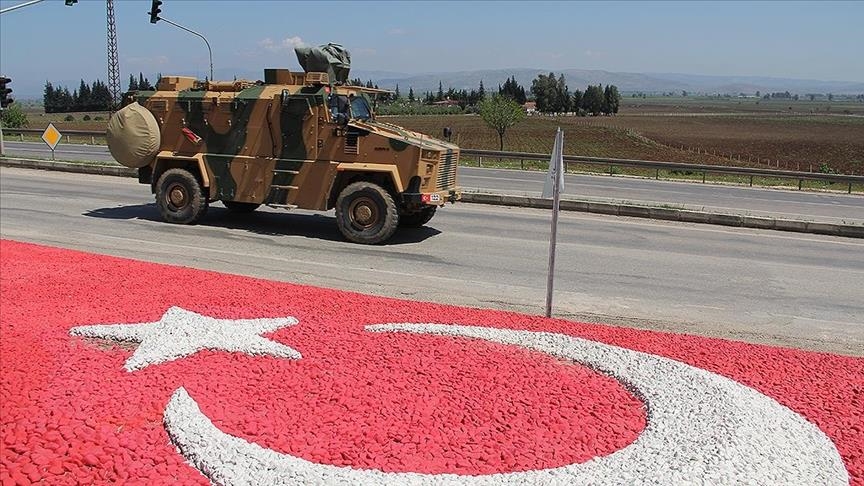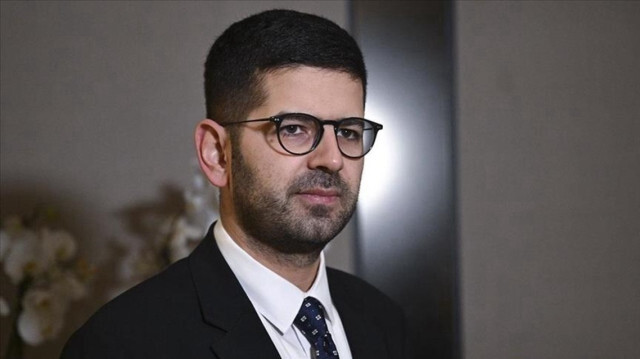ANALYSIS – Türkiye’s cross-border operations and their legitimacy
The writer is a lecturer at Bahcesehir University in Istanbul, defense and security analyst, and military veteran
ISTANBUL
As is widely known, NATO’s Article 5 suggests that an attack on one NATO member will be considered an attack on all of them. The first and only event in the history of NATO in which Article 5 came into force is the 9/11 attacks in the US. Article 5 was activated on the grounds of fighting terrorism, the invasion of Afghanistan was started with NATO countries, and later came the invasion of Iraq.
NATO’s one-way security sensitivity
As many will remember, during the occupation of Iraq, in 2004, after four private security guards were hanged on a bridge in Fallujah, the US carried out one of the heaviest residential area attacks there. The most powerful weapons of conventional warfare – B-1, B-2, B-52, F-series warplanes, Apache attack helicopters – were used from the air, and from the ground, deadly fire support vehicles and armored elements “including uranium core projectiles” were used. As a result, more than 2,000 people died, and residential areas of Fallujah were almost completely destroyed.
In the present, solidarity among NATO members shows itself through various incidents. For example, after missile parts of uncertain origin came down in November, resulting in the deaths of two people in NATO member Poland during the Russia-Ukraine war, great sensitivities arose in NATO headquarters and in the member states, and NATO-oriented reactions were manifested in a way that created an extremely strong public diplomacy effect.
Türkiye’s border security and double standards
NATO, which Türkiye has been a member of since 1952, boasting the alliance’s second-largest army, can be defined as a partnership of trust “at the conceptual, geopolitical, and strategic level.” Türkiye is also an indispensable part, wing, and key country of the geopolitical formation and global initiative of NATO and the US. However, since Ankara has not received the support it expected from its NATO allies in the fight against terrorism and security concerns, there has recently been a growing crisis of confidence in relations with the alliance.
For example, the YPG/PYD/PKK terrorist group, which attacked Türkiye as a NATO country, is being protected, funded, trained, equipped, managed, and directed by some major NATO countries, especially the US, creating great discomfort for Ankara. However, as is known, there are mutual promises and agreements made with allies in Ankara’s fight against terrorism. According to an agreement signed in 2019 with then-Vice President Mike Pence, who was sent to Türkiye by then-US President Donald Trump, it was envisaged that the terrorist group would take its heavy weapons and go 30 kilometers below Türkiye’s southern borders [2]. However, both data from the field and statements made by authorities show that this was not followed and the promised support was not given to Türkiye.
Costs of protecting terrorist group PKK
The consequences of feeding an existential terrorist threat by the Atlantic alliance itself will not affect Türkiye alone. In a region destabilized by terrorism, many security threats, especially migration, are emerging for the whole world. On the other hand, the support given to terrorism, which targets many civilians, poses a great physical, conceptual, and ethical threat to concepts such as democracy, human rights, freedom, and peace that the Atlantic alliance claims to defend, as well as the loss of trust and coordination of Türkiye, leading to geopolitical turbulence which is hard to manage.
Türkiye’s just cause
According to Turkish President Recep Tayyip Erdogan, the YPG/PKK terrorist organization has fired 764 mortars, rockets, howitzers, and artillery shells into NATO ally Türkiye from the areas it was given by the US since 2017. In these attacks, 32 innocents lost their lives and 261 people were injured. Again, 153 Turkish soldiers and police were killed and 173 injured in attacks targeting Türkiye by terrorists that are supported across the border. These numbers do not include the bloody attacks in Syria or at border contact points, or the hundreds of civilians massacred inside Syria in areas controlled by Türkiye.
Considering the fight and measures taken by Western countries against the terrorist attacks of Daesh/ISIS, Türkiye’s fight within and across borders against the attacks of the terrorist organization YPG/PYG/PKK, to which tens of thousands of victims, including civilian targets, has been sacrificed for 40 years, it should be treated with a fair and “empathy-generating” view.
Although the US and some NATO countries, together with Russia, think that they are using the bloody terrorist group and that they will achieve some of their ominous goals, it is essentially a terrorist group; it benefits from being used by the said countries, some EU countries, Russia and some regional countries that have relations with the group. The terrorist group is trying to reach its goals and interests through a covert threat to Western countries. The best example of this is the threats to release the Daesh/ISIS prisoners it holds or quitting the fight against Daesh/ISIS.
It has to be understood that a radical terrorist group (Daesh/ISIS) and radicalism in the region, cannot be cleared out by another terrorist group (PKK/YPG/PYD) which disguises itself as secular, but is of Marxist-Leninist-Internationalist origin, and exploits Kurdish identity.
*Opinions expressed in this article are the author’s own and do not necessarily reflect the editorial policy of Anadolu Agency.
[1] https://bigpara.hurriyet.com.tr/haberler/genel-haberler/nato-5-maddeyi-uyguluyor_ID378029/
[2]
Anadolu Agency website contains only a portion of the news stories offered to subscribers in the AA News Broadcasting System (HAS), and in summarized form. Please contact us for subscription options.




